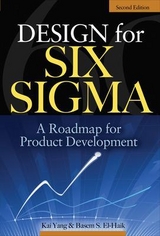
Design for Six Sigma
McGraw-Hill Professional (Verlag)
978-0-07-141208-7 (ISBN)
- Titel erscheint in neuer Auflage
- Artikel merken
The attraction of Six Sigma is obvious - designs that work, fewer defects in manufacturing, lowered production costs, and greater customer satisfaction. With these pluses, it's no wonder the world's leading companies are adopting the Six Sigma approach to product development in ever-growing numbers. Now here's a powerful engineering resource that makes it easier to implement Six Sigma in new product and service development, one step at a time. Written by hands-on Six Sigma quality experts - who write with the excellence Six Sigma can help you achieve in your products and services - "Design for Six Sigma" provides unrivalled real-world new product development experience and priceless walkthroughs that help you choose the right design tools at every stage of product development.You get the detailed directions, careful comparisons, and worked-out calculations that make every step easier and make sense of every step. This trailblazing guide is the only resource that gives product and service designers, project and quality engineers, and Six Sigma trainers a true roadmap to product excellence, from customer requirements to customer satisfaction.
Writing in a clear, easy-to-follow style, the authors provide: a systematic method for achieving world-class quality in product development and manufacturing; revealing inside-industry case studies; groundbreaking comparisons of traditional quality tools with newer approaches; focused examinations of engineering tools such as DOE (Design of Experiment), Taguchi Method, Axiomatic Design, and TRIZ (Theory for Inventive Problem-Solving).It also includes all the information, insights, and knowledge covered by the ASQ Black Belt examination. Starting with basic Introduction to Quality concepts, "Design for Six Sigma" goes on to deliver in-depth coverage of essential topics such as: fundamentals of Six Sigma; basic Six Sigma Statistical Tools; fundamentals of Experimental Data; Taguchi's Robust Parameter Design; tolerance design; introduction to Principles of Design; and much more. You'll also find a list of acronyms and a bibliography. Worth its weight in gold to any professional interested in the development of robust products, "Design for Six Sigma" is a tool you'll turn to again and again - and your quality and productivity is sure to reflect it.
McGraw-Hill authors represent the leading experts in their fields and are dedicated to improving the lives, careers, and interests of readers worldwide McGraw-Hill authors represent the leading experts in their fields and are dedicated to improving the lives, careers, and interests of readers worldwide
PREFACEChapter 1: Quality ConceptsChapter 2: Six Sigma FundamentalsChapter 3: Design for Six SigmaChapter 4: Design for Six Sigma DeploymentChapter 5: Design for Six Sigma Project AlgorithmChapter 6: DFSS Transfer Function and ScorecardsChapter 7: Quality Function Deployment (QFD)Chapter 8: Axiomatic DesignChapter 9: Theory of Inventive Problem Solving (TRIZ)Chapter 10: Design for XChapter 11: Failure Mode-Effect AnalysisChapter 12: Fundamentals of Experimental DesignChapter 13: Taguchi's Orthogonal Array ExperimentChapter 14: Design Optimization: Taguchi's Robust Parameter DesignChapter 15: Design Optimization: Advanced Taguchi Robust Parameter DesignChapter 16: Tolerance DesignChapter 17: Response Surface MethodologyChapter 18: Design ValidationACRONYMSREFERENCESINDEX
| Zusatzinfo | 200 Illustrations, unspecified |
|---|---|
| Sprache | englisch |
| Maße | 158 x 234 mm |
| Gewicht | 1003 g |
| Themenwelt | Mathematik / Informatik ► Informatik ► Theorie / Studium |
| Wirtschaft ► Betriebswirtschaft / Management ► Unternehmensführung / Management | |
| ISBN-10 | 0-07-141208-5 / 0071412085 |
| ISBN-13 | 978-0-07-141208-7 / 9780071412087 |
| Zustand | Neuware |
| Haben Sie eine Frage zum Produkt? |
aus dem Bereich



